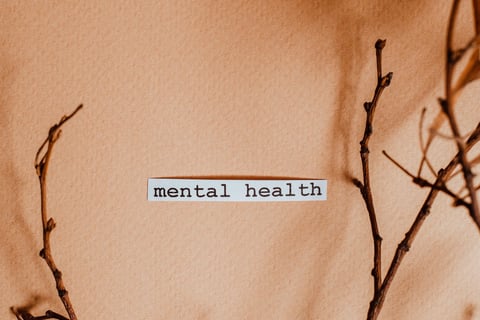
Warning: Ignoring These Diet and Mood Connections Could Harm Your Well-Being!
Discover how 'Diet and Mood Connections' impact your health! This article reveals essential tips on eating habits that influence your happiness and well-being. Don't miss out on the secrets to a balanced life.
Brian Chiquirin
2/1/20249 min read


Hey there! You're probably juggling a ton, right? Work, studies, maybe hitting the gym, and trying to have a social life. But let me ask you this: have you ever stopped to think about how what you eat affects not just your body but your mind too? I'm here to give you the lowdown on this, and trust me, as a stressful person myself, I know a thing or two about the diet-mood connection.
Why Should You Even Care About Diet and Mood Connections?
So, imagine your brain as this high-powered, super sophisticated computer. It needs the right kind of fuel to function at its best. What you eat can literally change the chemical makeup of your brain, thereby impacting the connection between diet and mood. Omega-3 fatty acids, vitamins, minerals - these aren't just fancy words; they're your brain's best friends.
Let's delve deeper into the specifics of how diet influences mood. Omega-3 fatty acids, for example, are crucial for brain health. A study published in the Journal of Clinical Psychiatry found that omega-3s played a significant role in improving mood and combating depression. Foods rich in these fatty acids, like salmon, walnuts, and flaxseeds, are not just good for your heart but also vital for maintaining healthy brain function. Similarly, vitamins such as B12, found in lean meats and dairy, are essential for good brain health. A deficiency in B12 can lead to memory problems and brain fog. As for minerals, magnesium – often found in almonds, spinach, and avocados – is known for its role in nerve function and mood regulation. A review published in the journal Magnesium Research highlighted the importance of magnesium in preventing depression and anxiety, further solidifying the link between diet and emotional well-being.
But it's not just about individual nutrients; it's also about the overall diet. The Mediterranean diet, rich in fruits, vegetables, whole grains, olive oil, and lean protein, has been linked to a lower risk of cognitive decline and depression. A pivotal study in the Archives of General Psychiatry showed that participants who followed a Mediterranean diet supplemented with nuts or extra-virgin olive oil had a 30% lower risk of major depressive disorders. This data underscores the importance of a balanced diet, emphasizing that what you eat doesn't just fuel your body; it shapes your mental health and cognitive abilities. By choosing foods that nourish your brain, you're making a choice to enhance your mental clarity, emotional well-being, and overall brain function, highlighting the crucial connections between diet and mood.
The Gut-Brain Superhighway
Ever felt butterflies in your stomach when nervous? That's your gut-brain axis at work physically telling you there is a connection between your mood and diet. It's like a two-way street where your gut health can directly affect your mood. Think of it as your internal mood regulator. This connection works through millions of nerves and neurons, kind of like a superfast highway sending messages between your gut and brain. Imagine eating a big, greasy burger and feeling sluggish afterwards. That's your gut telling your brain, "Hey, I'm not happy!" And your brain responds by affecting your mood and energy levels. It's a direct line of communication, with your gut health playing a huge role in how you feel mentally. Once again, telling you how your diet influences your mental state throughout the day.
On the flip side, your brain can also send signals to your gut. For instance, when you're stressed or anxious, ever noticed how your stomach might feel upset? That's your brain sending stress signals down the highway to your gut. Stress can disrupt the diet-mood balance, leading to digestive issues like stomach aches or loss of appetite. The key takeaway here is simple: taking care of your gut health isn't just about avoiding stomach problems; it's about taking care of your mental well-being too. Eating a balanced diet with plenty of fiber, probiotics, and hydration can keep this superhighway running smoothly, fostering a positive diet and mood relationship, leading to a happier mind and a happier you.
The Bad Guys in Your Diet
In the rush of life, it's easy to grab processed foods. They're quick, convenient, but they're also linked to higher rates of depression. Remember the time you ate fast food for a week straight during finals? Not the best feeling, huh? That is a prime example of how diet impacts your mood.
Now, let's chat about sugar. It's like that friend who's fun at parties but a headache the next day. Consuming too much sugar can lead to mood swings that feel like a rollercoaster. Imagine eating a chocolate bar and feeling on top of the world, only to crash and burn an hour later. This isn't just about feeling "down" – studies show that high sugar diets are linked to a higher risk of depression. It's like giving your brain a sugar high followed by a mood low.
And then there's our pals, alcohol and caffeine. Regular drinking might seem like a good way to unwind, but it's a bit of a double-edged sword. Alcohol can mess with your sleep and mood in the long run. Think about those groggy, irritable mornings after a night out – that's your brain on an alcohol hangover. On the flip side, caffeine, our go-to for staying awake, can actually make anxiety worse and disrupt sleep if you overdo it. Picture yourself after that fourth cup of coffee – hands shaking, heart racing, mind buzzing. It's not just about the jitters; it's about how these little habits can add up and impact your overall mental health. Understanding the link between diet and mood is key to learning what your balance is. Once you have found your balance your mind will thank you.
Eat This Instead!
Now let's talk about the good stuff. Foods rich in Omega-3s (like salmon), vitamins, and minerals (think nuts, leafy greens) are like fuel for a happier brain.
Omega-3s are like your brain’s best pals. Found in fish like salmon, they're essential for maintaining a healthy diet-mood balance. Ever felt better after a salmon dinner? That’s Omega-3s at work! Then there are nuts – walnuts, almonds, you name it. They’re not just for snacking; they're packed with magnesium, which is known for its mood-boosting properties in a balanced diet. And don’t forget about those leafy greens. Spinach, kale, and their friends are loaded with folate, a vitamin that’s key in fighting off low moods.
But it's not just about what you eat, it's also about when and how you eat. Ever skipped a meal and ended up grumpy? That’s because irregular eating can cause your blood sugar levels to drop, leading to mood swings. Eating balanced meals at regular intervals helps maintain steady blood sugar levels, keeping your mood stable. Think of it like keeping a fire steadily burning, rather than letting it flare up and die down unpredictably.
And then there's water. Yes, plain old H2O. It’s easy to forget, but staying hydrated is crucial for establishing a mood and diet synergy. Dehydration can make you feel sluggish, irritable, and even down. It’s like a plant wilting without water – your brain feels the same way. So, keep that water bottle handy and sip throughout the day. It's a simple, yet effective way to keep your mood and diet in harmony.
In short, combining these mood-boosting foods with balanced, regular meals and plenty of water is a straightforward, yet powerful way to positively influence your mental well-being. It's not about overhauling your diet overnight but making small, consistent changes that can lead to big improvements in how you feel. Remember, your diet is a key player in your mood game, so play it wisely!
Making It Work in Real Life
I get it; you're busy. But a few changes can make a big difference. Meal prepping on Sundays, carrying healthy snacks, and choosing water over soda can be game changers. These dietary adjustments are key in understanding the connection between diet and mood. Think about it – spending a couple of hours on Sunday preparing your meals for the week can save you from the temptation of fast food. Imagine opening your fridge to find a ready-made salad with grilled chicken, or some brown rice and veggies. It’s convenient and healthy! And when it comes to snacks, swap out those chips or candies for almonds, fruit, or Greek yogurt. These small substitutes not only keep you full but also stabilize your mood. Lastly, ditching soda for water is a no-brainer for both your physical and mental health. Hydration keeps your energy levels up and your mind clear.
Ever eaten a whole bag of chips without noticing? Happens to the best of us. Practicing mindful eating is a crucial link between diet and emotional well-being. This means eating without distraction – so no TV or scrolling through your phone. Focus on the flavors, textures, and how the food makes you feel. Think about Remy from Ratatouille - savoring each bite, exploring the symphony of flavors and textures, fully immersed in the experience. You’ll likely find that you eat less but enjoy it more. It also means stopping when you’re full, not when your plate is clean. This simple practice can help you avoid overeating and the sluggishness and guilt that often follow.
Mindful eating also involves being aware of your food choices and their impact on your mood. For example, you might notice that a breakfast high in protein keeps you fuller and more focused than a sugary pastry. Or that a balanced lunch doesn’t give you that afternoon slump. Being attuned to these diet-mood connections empowers you to make better choices for your overall well-being.
When Diet Isn’t Enough
Sometimes, changing your diet isn't enough, and that's okay. Diet is just one piece of the puzzle. Regular exercise, good sleep, and managing stress are equally important. They all work together to keep you feeling your best. For example, regular exercise doesn't just tone your muscles; it releases endorphins that naturally boost your mood. Good sleep, on the other hand, is like hitting the reset button for your brain, giving it the rest it needs to manage emotions effectively. And when it comes to stress, techniques like meditation or simply taking a walk in nature can significantly lower your stress hormones, like cortisol, which in turn can improve your mood when dieting itself is not sufficient. Certain diets could be balanced for one person yet not for another. The Mediterranean diet may strengthen the link between dietary habits and mental health for me, but a low-carb diet may just leave me feeling groggy and sleepy throughout the day.
However, if you're still feeling constantly down, anxious, or just not yourself after having taken proper actions, it might be time to seek professional help. Therapy and medication, along with dietary changes, can make a world of difference. Remember, there's no shame in reaching out for help. Mental health professionals can provide tailored advice and treatment that goes beyond general wellness tips. For instance, cognitive-behavioral therapy (CBT) has been proven effective in changing negative thought patterns. Also, in some cases, medication may be necessary to correct chemical imbalances in the brain. It's about finding the right balance and combination of treatments that work for you. If you're looking for a place to start, websites like Better Help (betterhelp.com) and TalkSpace (talkspace.com) offer online counseling services. Additionally, the National Alliance on Mental Illness (nami.org)provides resources and support for those struggling with mental health issues. Note that I'm not sponsored by these sites, but I've personally seen how they've helped many people.
Wrapping It Up
So, there you have it – your guide to understanding how diet affects your mood and overall well-being. Remember, you're not just what you eat, but also how you eat, sleep, and move. It's about finding that balance and making small changes that add up to a big difference.
I believe in you. You have the power to make changes that can positively impact your life. And hey, if you ever feel overwhelmed, remember that it's okay to ask for help. Your mental health is just as important as your physical health, and taking care of it is one of the best things you can do for yourself.
Stay awesome, and here's to a happier, healthier you! Continue searching our site for more informative and easy to understand articles concerning your mental health.












